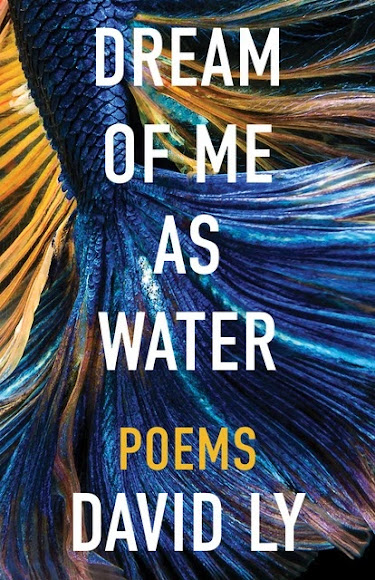Dream of Me as Water, David Ly
Palimpsest Press, 2022
There are longings at the heart of David Ly’s Dream of Me as Water. Through poems that disguise themselves and appear conversational, Ly opens the way to confidences. The collection’s sections highlight this mounting intimacy, this slow opening up: “Dream,” “Dream of Me,” “Dream of Me as Water.” The speaker does not change topics, does not jump in; slowly, he advances, ever deeper, within the same element, bringing back images and motifs, letting the relationship to his reader become more complex, closer, more familiar.
The words are precise; the phrasings are light: “I want to be the ocean // and the lightning that could // strike it at any moment.” (37) Or “The water ripples and I jolt / awake on my back.” (25) Or “Oceanside, I haul my net / reel and reel / until the present thrashes // its prehistoric fins and stares up at me / asking” (61) But as I attempt to choose lines to cite to make this point, I find that they are all so intricately woven together that any choice feels like an unjust separation from the rest of the poems. These poems, even when broken up and making their way one step at a time across the page, are reaching for the long line, the end of the breath, the falling into the next breath. The meaning of any one line within a poem depends heavily on what is yet to come and on the preceding accumulation.
And yet Ly’s language is the language we speak, transfigured by earnestness and the pull of metaphor. Picture a back and forth, a wide space between this reversal of the physicality of fishing: “Softly lit / by glowing lures / thought / leaks / (drop by drop) / into a disordered world” (67). His poems are deeply mediated and situated by Google searches, Instagram feeds, television programs, movies, and trend-observing objects (a pink Himalayan salt lamp). They contain glimpses and echoes of poems from his debut collection, Mythical Man, recognizing that his readers are likely to already have some familiarity with his writing, or likely to want to deepen that familiarity – to go back to the source, in a sense.
These poems are direct, with the directness from which we wish to preserve our loved ones. They begin with lines like “I’m looking to feel better” or “If I could go back and change” or “You said you wanted nothing.”
Visually, some of these poems (7) are rivers: winding arrangements of short lines, evoking currents, the carrying of objects and selves, but also the strength of thoughts, their obsessiveness, the further thoughts to which they deliver us. Ly gives us the passage of time and the stability of feeling in these sideways transitions. In the poem “Still,” from the beginning to the end, it’s the movement within that gives the words meaning, so that this meaning isn’t transferable to only one of its segments.
Some of these poems (2) are pools: blocks of prose that come close to narration. They let an idea sit – witnessing a meteorite fall and deeply caring for someone; a sudden love for Stevie Nicks and the fear of the implications of this love. No deepening, nothing hidden, only the mystery of the presence of elements and their juxtapositions.
Some of these poems (8) are waves: a placement back and forth on the page, where the flow of ideas is loosened; a balancing movement, touching the extremes of oppositions where there is no middle. Their movement steps over the disjunctions Ly often includes, explicitly in the text, implicitly in its placement.
And while most poems play with more, or much less, regular arrangements on the page, these three unfixed forms stand out in the commitment they embody. Although many of the poems in this collection reference solitude, Dream of Me as Water is a commitment to presence and togetherness, it holds the promise of laughter. It’s a collection written with the seriousness and the lightness of dreams, the anticipation of the moment when we can finally awaken and recount them to those who have been waiting for us to join them.
Jérôme Melançon writes and teaches and writes and lives in oskana kâ-asastêki / Regina, SK. His most recent chapbook is with above/ground press, Tomorrow’s Going to Be Bright (2022, after 2020’s Coup), and his most recent poetry collection is En d’sous d’la langue (Prise de parole, 2021). He has also published two books of poetry with Éditions des Plaines, De perdre tes pas (2011) and Quelques pas quelque part (2016), as well as one book of philosophy, La politique dans l’adversité (Metispresses, 2018). He has edited books and journal issues, and keeps publishing academic articles that have nothing to do with any of this. He’s on Twitter still, at least as of the time of writing, and will be as long as it is more than ruins, and back on Instagram, both at @lethejerome, and trying out Mastodon @lethejerome@mstdn.social.





